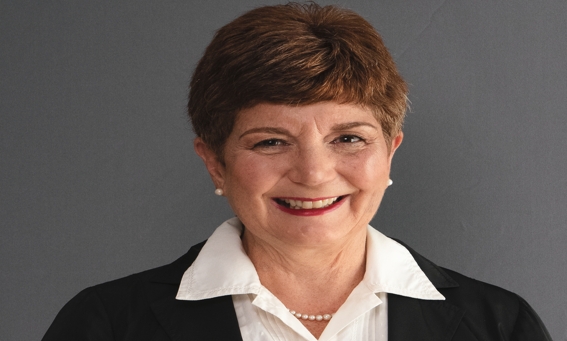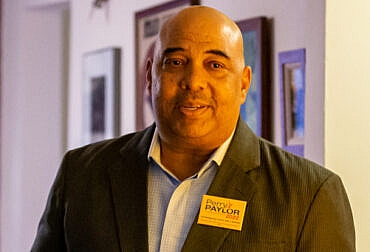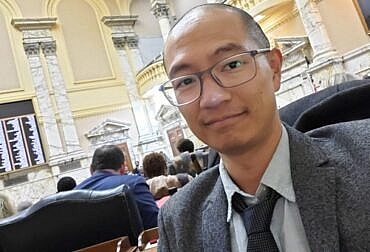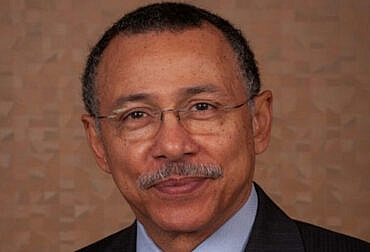Linda Foley is a Member of House of Delegates since December 17, 2021. Member, Environment and Transportation Committee, 2022- Present. She born in Pittsburgh, PA. She received B.S. (journalism) from Medill School of Journalism, Northwestern University in 1977. President, Newspaper Guild, 1995-2008 (secretary-treasurer, 1993-95). Vice-President, Communications Workers of America, 1995-2008. Past Chair, Montgomery County Democratic Central Committee (2018-2021). Past president, Berger-Marks Foundation. Hall of Achievement, Medill School of Journalism, 2006. Alumni Merit Award, Northwestern University, 2007. The interview covered topics of diversity in MCDCC, initiatives in House of Delegates, traffic, mental healthcare and future agenda.
Nagender Madavaram: Good morning, Delegate Linda. Thanks for giving me time. You did great job as Chairwoman, Montgomery County Democratic Central Committee.
Linda Foley: It’s a pleasure to be here, Nagender. Thank you for inviting me. Well, I think that’s how we know each other where we met each other was through my work there and I really enjoyed being chair of the Montgomery County Democratic Central Committee and the Montgomery County Democratic Party. It was kind of a challenging time because I became chair in 2019 and then shortly thereafter, the COVID pandemic hit. We knew, we were going into a very important election year because of the presidential election. We knew it was important for us to defeat Donald Trump and we were quite concerned about it. How we were going to do that given the COVID pandemic? Thank goodness for technology like Zoom and Microsoft Teams, we were able to hold events and energize people. We had a very successful 2020 election. We had record numbers of people voting. We made sure that we got out information about how you could vote safely by mail or early voting or putting your ballot in the Dropbox. We spent quite a lot of time and energy as a Democratic Party. We spent a lot of time on getting yard signs distributed to people around Montgomery County. Our efforts made a difference, record number of people participated in that election. I’m very proud that we were able to do that as a Montgomery County Democratic Party and Montgomery County Democratic Central Committee.
Diversity in MCDCC:
Nagender Madavaram: Montgomery County is a diversified county. What initiatives you took to encourage the inclusiveness and the diversity in MCDCC?
Linda Foley: Well, we recognized that. I mean, it’s clear to anyone who lives here that Montgomery County is a very diverse county with a lot of different communities. You know what we did at MCDCC; number one, we make sure that we did outreach to our communities and communicate with people in their own language. So, we spent some time making sure that we had materials that we could distribute in the Latino community. We guide them to resources where they could get information in their native language. That was one thing that we did. The other thing that we really tried to reach out to voters in underserved communities and communities of color to get them registered to vote. If they’re not registered, they can’t vote and their voices won’t be heard. So, we spent some time and resources on that as well. During the pandemic, it was difficult to reach out to people, so we felt it was important to make sure that we publicize as much as possible where you could go to register to vote. In Maryland, it’s not hard to register to vote. You can do it when you get your driver’s license.
There was a change at the MCDCC and more people from communities of color were coming on to the MCDCC. I worked hard with my partner in District 15, Greg Wims, we reached out to the African American community in our county. We held many Zoom events to make sure that we reach them and specifically, we focused on some events. For example, we had one event around the Juneteenth. It was focusing on Harriet Tubman and her legacy. We also had a campaign to add Harriet Tubman on the $20 bill. We also brought in people from various communities into the MCDCC activities and into the activities of the Democratic Party.
People from the Muslim community, Latino community, North Africa community, West Africa community, LGBTQ folks, Indian Americans, Pakistani Americans and lots of different community people are running for MCDCC. So that’s very encouraging that people from those communities want to participate in our Democratic Party. One of my goals as chair was to expand the party, expand the tent and make sure that we get more people into the tent.
Initiatives in House of Delegates:
Nagender Madavaram: Recently, you got appointed as a Delegate. You spent few months but you did remarkable job.
Linda Foley: Fortunately, I became a Delegate when I was appointed to replace Delegate Kathleen M. Dumais who was appointed by Governor Hogan to be a judge in the Circuit Court. So, she had to resign her seat in the General Assembly and I was appointed in late November to fulfill her seat. I didn’t have much time to get acquainted with the processes and everything related to the General Assembly. I took my place in January as a Delegate representing the people of District 15 alongside David Fraser-Hidalgo and Lily Qi. We quickly gelled as a team together and worked with our Senator Brian Feldman. One of the things that I’m very proud of that we brought over $10 million community development projects to District 15 during this legislative session. That’s a record amount of money to come to District 15.
I got three bills passed into law, which is very unusual for a first time Delegate. I’m very proud to say two of the Bills had to do with the rules around towing of commercial vehicles with cargo. We put in place rules so that if a commercial vehicle is towed and it contains cargo, that the cargo is not held for long periods of time unnecessarily, which helps free up the supply chain a little bit. We have enough supply chain issues we don’t need to have cargo in storage that isn’t moving somewhere because the vehicle got towed. So, I had two bills related to towing and then I had a bill passed to help Easy Pass customers who have faced a lot of difficulties and hurdles. I was able to get a bill passed to extend the amount of time that Easy Pass holders have to dispute charges that they think may be erroneous on their Easy Pass bills. The time period was increased from 120 days to two years. So, those were three bills I passed, but in addition to that we passed some very consequential legislation.
I along with Delegate Fraser-Hidalgo, serve on the Environment and Transportation Committee, we passed a ground breaking Climate Solutions Now bill that puts Maryland in the very front, even ahead of California. When it comes to fighting climate change that comprehensive bill included things like electrification of our state fleet of vehicles, a pilot project for electrification of school buses, incentives for people to purchase and use electric cars. Incentives for production of solar energy. Introduction of new building standards so that buildings in Maryland will be much more environment friendly and don’t release fossil fuel emissions. The whole goal here is to get to 0 fossil fuel emissions by the year of 2045, which seems like a huge goal. The interim goal is reduction of 60% of our fossil fuel emissions by 2035. You know, the other part of that bill is to focus on keeping our Chesapeake Bay clean. We also passed paid family leave and medical leave which is already in 14 other states. Now, Maryland is going to have that too.
We also secured income tax relief for retirees. We banned untraceable so-called ghost guns. You know, gun safety is a very important issue and we see everyday failure of the federal government to address this issue. Just this week the terrible tragedy in Texas. Well, here in Maryland we are making progress on gun safety and we just passed the ban on untraceable ghost gun firearms and we also created security requirements for firearm dealers. So that guns are not so easily stolen from firearm dealers in Maryland. Our health insurance costs are the lowest in the country and we worked on that to improve.
We also improved access to abortion care because so many states look like are going to be in a position to ban legal and safe abortions. We feel like we’re going to get an influx of people coming to Maryland because here women do get to choose what they do with their own bodies. So, those are just a couple of things that we did. A ballot initiative for voters to vote on whether or not we should legalize recreational cannabis or marijuana. Laws being passed would have been a marquee achievement. We did all of that during the last session of the General Assembly. I was very excited to be able to work with the District 15 team and work on all these issues. It was very exciting and very rewarding, and I think the people of District 15 and the people of Maryland are the beneficiaries of the hard work that we did.
Traffic:
Nagender Madavaram: Traffic is huge issue in the county. There are various proposals for solving traffic problem. What is your stand on this important issue?
Linda Foley: Well, you know the whole issue of widening I-270 and putting toll lanes, some people call them the Lexus Lanes because they’re going to be very expensive. That’s a public part doing that and also at widening the Beltway, it looks like the widening of the Beltway may or may not happen. As a part of the widening of I-270, there’s also a proposal to widen and fix the American Legion Bridge. So, one thing I can say for sure is that the American Legion Bridge needs to be fixed. That’s a safety factor, so there’s that piece of it. Then, in terms of widening and allowing toll lanes on I-270, there are two aspects of this that make this a very difficult issue. I will say this, I do think that the public-private partnership to widen I-270 that’s the governor’s initiative, and it looks like with the votes on the County Council, that is going to go forward whether we want it to or not. It looks like that’s going to go forward there.
There may be some challenges along the way and there may be some push back along the way, but the Governor is moving forward. If we get a new Governor that could change. I’m not sure that toll lanes are the best solution. The other aspect of this that we have to think about is do we really want to encourage more cars on the roads? Do we want to work on things that encourage fewer cars? That being said, the people in Clarksburg, Boyd’s and Dickerson and even Frederick County, they still need to be able to commute to work. I don’t think that we can completely rule out that we certainly do need more roads and better roads. Our roads need to be fixed and improved. I’m just not sure that relying on toll lanes on I-270 is the best way to address that, but I would rather see is more creative solutions. All kinds of proposals are floated as possible future solutions with rail expanding the Shady Grove Metro, rapid bus transit, which is something that we did get money for in this session.
I think the question for something like rapid bus transit is how do we incentivize people to actually use the rapid bus. We have to prove to them first that it’s reliable and that it’s going to fulfill their needs. So that’s a challenge for us. We also need to improve the MARC. We should put money into the MARC rail system, which is my own personal opinion. That’s a resource that we need to improve right now. You can use the MARC to go to Western Montgomery County. We need to work with CSX who owns the rail lines there to improve that corridor so that we make MARC much more like the Virginia rail system, which is much more reliable and dependable than the MARC. I think we need to do more to expand the Red Line metro beyond Shady Grove. I think that’s a very long-term proposition. Metro has a lot of problems with the current system that have to be fixed first before we talk about expanding metro. There are more high-tech solutions such as a monorail down the middle of I-270. I think that those are much more long-term solutions, so this has to be very holistic. We have to think about not just relieving the traffic congestion but we also have to really think about what’s the effect on our climate by what we do here. What we do today is go to affect our environment for years to come. So, we need to make sure that we are keeping that in mind.
Mental Healthcare:
Nagender Madavaram: Mental health also major issue in the county because 30% of Maryland population has mental issues. COVID exacerbated the problem in children.
Linda Foley: The pandemic has really exacerbated our mental health problems in Maryland. You mentioned children, that’s particularly problematic because children were at home in pandemic. They were confined to their houses, they couldn’t see their friends, they couldn’t socialize. They really weren’t getting the benefits of real social maturation. Children lost essentially, 2 years of socialization you can certainly understand the impact that has in terms of mental health. Very, difficult for children, but also very difficult for adults. There is a tremendous amount of stress put on everybody and as you point out, particularly children. So, we need to make sure that our schools are equipped to address mental health issues with our students. The blueprint for Maryland’s future did have some provisions for mental health, but not enough. In Montgomery County Public Schools, we have had a real shortage of nurses. We need to have trained mental health professionals in our schools. We did in the last legislative session put some additional funding into suicide prevention, which is a real epidemic among our young people. We need to make sure that our education professionals not only have mental health resources that they can rely on to back them up, but they also need to be trained for signs of acute mental stress and suicide prevention. A lot of these things that we see with kids lashing out, you know, can be a prelude to suicidal tendencies.
Unfortunately, during the last four or five years, bullying has become a very difficult problem in schools. It seems to be growing. My personal opinion is that we had someone in the White House who was just mean and thought it was OK to bully people. You know on social media or whatever and that made the problem worse because it’s sort of said it’s OK to be mean to people. It’s OK to ridicule people. It’s OK to bully people and make them feel like you’re superior and they’re inferior that also has led to a lot of mental health issues, particularly for children who are subjected to that. We need to make sure that our schools are equipped to handle all.
I really think school shootings a big problem. The primary problem is too many guns and easy access to guns but there is also a mental health component to that too. So, what makes an 18-year-old feel like he has to kill 21 people, including twenty students. What kind of mental stress is there? What pushes that person to that point? We also need to figure that out. We need to make sure that those resources are available in the schools and also in our health plans.
Future Agenda:
Nagender Madavaram: What is your agenda and vision for District 15?
Linda Foley: Well, I’m very proud to be a member of the District 15 team in Annapolis, our Senator Brian Feldman is a real leader in the Senate. He has been there for many years and he has built up a really stellar reputation and delivers a lot of very good legislation for our district and for the state of Maryland. So, in the House of Delegates, Delegate Fraser Hidalgo, Delage Lily Qi, I and Senator Feldman keeping partnership among the four of us is very important. I feel very strongly that we need to do more work in the area of reproductive rights for women. I think we need a constitutional amendment in the Maryland Constitution. Put it before the voters, and I think the voters will vote for it that enshrines the right for women to choose and the right for women to have control over their own bodies. We need make this change in Maryland Constitution, because we can’t control what happens at the federal level all the time.
There’s more we need to do with respect to climate change. We have two trash incinerators left in the state and those are very polluting. One of those is in Dickerson, Maryland in District 15. We need to close those incinerators and start to look at what really constitutes clean energy. We need to move to more clean energy. I’m also committed to continue to expand pre-kindergarten childcare at our schools. We continue to put money into career and technical education. Everyone may not need to go to a four year or six-year college program to be able to have a good job and to support their families. I think it’s very important that we support our career and technical education programs in our schools.
I think we need to look at student loan debt and we need to make some fixes there on student loan debt for higher education. I would like to see us work a little bit on prescription drug costs and bringing those down. I think you might see us do some of that in the next legislative session and then finally my own little pet project is a climate project. I have heard from many constituents that we should ban the use of gas-powered leaf blowers in Maryland. District of Columbia banned them last year. I did put in a bill to do that in the 2022 legislative session. It did not pass, but we’re working now. During the interim to try to put together a work group that includes landscapers, environmentalists, and residents, as well as retailers to try to figure out. There are some challenges there but I think we can make that work. They’re doing it in DC, California, and Hawaii. I think we can do it here in Maryland. I have another small goal that gasoline engines and leaf blowers are the same as the gasoline engines in lawn mowers. Those are called 2 stroke engines. So, if you’ve been driving a car for a few years, you remember the cars used to have a carburetor and the carburetor would take the gasoline, the air and mix it together that’s what the fuel is. Those are very dirty. So those kinds of engines we need to phase them out so that we move more toward cleaner engines. I want to say a cleaner, less fossil fuel emitting engines and power sources.











